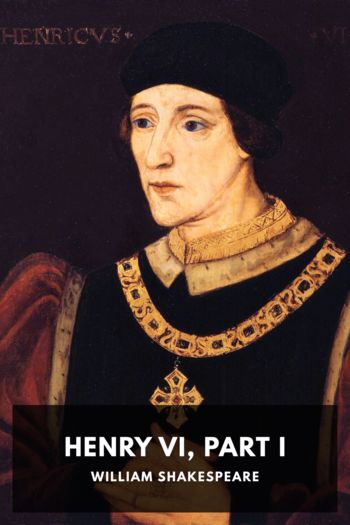Henry VI, Part I, William Shakespeare [classic books to read TXT] 📗

- Author: William Shakespeare
Book online «Henry VI, Part I, William Shakespeare [classic books to read TXT] 📗». Author William Shakespeare
By William Shakespeare.
This ebook is the product of many hours of hard work by volunteers for Standard Ebooks, and builds on the hard work of other literature lovers made possible by the public domain.
This particular ebook is based on a transcription produced for Massachusetts Institute of Technology and on digital scans available at the HathiTrust Digital Library.
The writing and artwork within are believed to be in the U.S. public domain, and Standard Ebooks releases this ebook edition under the terms in the CC0 1.0 Universal Public Domain Dedication. For full license information, see the Uncopyright at the end of this ebook.
Standard Ebooks is a volunteer-driven project that produces ebook editions of public domain literature using modern typography, technology, and editorial standards, and distributes them free of cost. You can download this and other ebooks carefully produced for true book lovers at standardebooks.org.
Dramatis PersonaeKing Henry the Sixth
Mayor of London
Duke of Gloucester, uncle to the King, and Protector
Duke of Bedford, uncle to the King, and Regent of France
Thomas Beaufort, Duke of Exeter, great-uncle to the King
Henry Beaufort, great-uncle to the King, Bishop of Winchester, and afterwards Cardinal
John Beaufort, Earl, afterwards Duke, of Somerset
Richard Plantagenet, son of Richard late Earl of Cambridge, afterwards Duke of York
Earl of Warwick
Earl of Salisbury
Earl of Suffolk
Lord Talbot, afterwards Earl of Shrewsbury
John Talbot, his son
Edmund Mortimer, Earl of March
Sir John Fastolfe
Sir William Lucy
Sir William Glansdale
Sir Thomas Gargrave
Mayor of London
Woodvile, Lieutenant of the Tower
Vernon, of the White-Rose or York faction
Basset, of the Red-Rose or Lancaster faction
A lawyer
Mortimer’s Keepers
Charles, Dauphin, and afterwards King, of France
Reignier, Duke of Anjou, and titular King of Naples
Duke of Burgundy
Duke of Alençon
Bastard of Orleans
Governor of Paris
Master-Gunner of Orleans, and his son
General of the French forces in Bourdeaux
A French Sergeant
A Porter
An old shepherd, father to Joan la Pucelle
Margaret, daughter to Reignier, afterwards married to King Henry
Countess of Auvergne
Joan la Pucelle, commonly called Joan of Arc
Lords, warders of the tower, heralds, officers, soldiers, messengers, and attendants
Fiends appearing to La Pucelle
Scene: Partly in England, and partly in France.
Henry VI, Part I Act I Scene IWestminster Abbey.
Dead March. Enter the Funeral of King Henry the Fifth, attended on by Duke of Bedford, Regent of France; Duke of Gloucester, Protector; the Duke of Exeter, the Earl of Warwick, the Bishop of Winchester, Heralds, etc. BedfordHung be the heavens with black, yield day to night!
Comets, importing change of times and states,
Brandish your crystal tresses in the sky,
And with them scourge the bad revolting stars
That have consented unto Henry’s death!
King Henry the Fifth, too famous to live long!
England ne’er lost a king of so much worth.
England ne’er had a king until his time.
Virtue he had, deserving to command:
His brandish’d sword did blind men with his beams:
His arms spread wider than a dragon’s wings;
His sparking eyes, replete with wrathful fire,
More dazzled and drove back his enemies
Than mid-day sun fierce bent against their faces
What should I say? his deeds exceed all speech:
He ne’er lift up his hand but conquered.
We mourn in black: why mourn we not in blood?
Henry is dead and never shall revive:
Upon a wooden coffin we attend,
And death’s dishonourable victory
We with our stately presence glorify,
Like captives bound to a triumphant car.
What! shall we curse the planets of mishap
That plotted thus our glory’s overthrow?
Or shall we think the subtle-witted French
Conjurers and sorcerers, that afraid of him
By magic verses have contrived his end?
He was a king bless’d of the King of kings.
Unto the French the dreadful judgement-day
So dreadful will not be as was his sight.
The battles of the Lord of hosts he fought:
The church’s prayers made him so prosperous.
The church! where is it? Had not churchmen pray’d,
His thread of life had not so soon decay’d:
None do you like but an effeminate prince,
Whom, like a school-boy, you may over-awe.
Gloucester, whate’er we like, thou art protector
And lookest to command the prince and realm.
Thy wife is proud; she holdeth thee in awe,
More than God or religious churchmen may.
Name not religion, for thou lovest the flesh,
And ne’er throughout the year to church thou go’st
Except it be to pray against thy foes.
Cease, cease these jars and rest your minds in peace:
Let’s to the altar: heralds, wait on us:
Instead of gold, we’ll offer up our arms;
Since arms avail not now that Henry’s dead.
Posterity, await for wretched years,
When at their mothers’ moist eyes babes shall suck,
Our isle be made a nourish of salt tears,
And none but women left to wail the dead.
Henry the Fifth, thy ghost I invocate:
Prosper this realm, keep it from civil broils,
Combat with adverse planets in the heavens!
A far more glorious star thy soul will make
Than Julius Caesar or bright—
My honourable lords, health to you all!
Sad tidings bring I to you out of France,
Of loss, of slaughter and discomfiture:
Guienne, Champagne, Rheims, Orleans,
Paris, Guysors, Poictiers, are all quite lost.
What say’st thou, man, before dead Henry’s corse?
Speak softly, or the loss of those great towns
Will make him burst his lead and rise from death.
Is Paris





Comments (0)